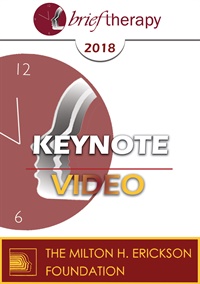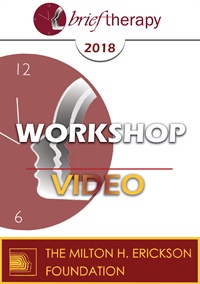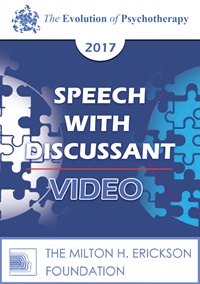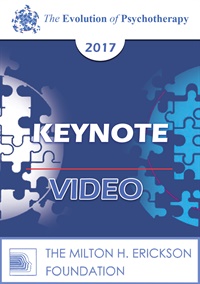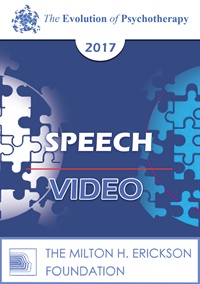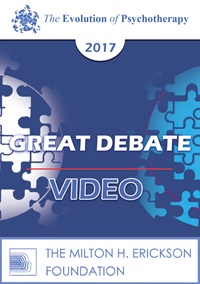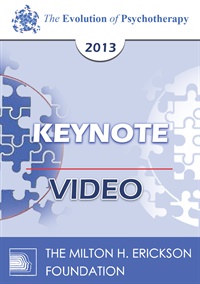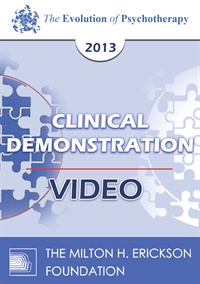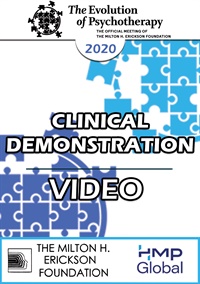
- Average Rating:
- Not yet rated
- Topic Areas:
- Cognitive Behavior Therapy (CBT) | Clinical Demonstrations | Art and Creativity | Psychotherapy | Storytelling | Constructive Narrative
- Categories:
- Evolution of Psychotherapy | Evolution of Psychotherapy 2020
- Faculty:
- Donald Meichenbaum, PhD
- Course Levels:
- Master Degree or Higher in Health-Related Field
- Duration:
- 1 hour
- Format:
- Audio and Video
- Original Program Date:
- Dec 12, 2020
- Short Description:
- Following a brief presentation of the “state of the art” concerning psychotherapy and an enumeration of the Core Tasks of Psychotherapy, the clinical demonstration (with a volunteer patient/audience member) will focus on ways to conduct Cognitive behavior therapy from a Constructive Narrative strengths-based perspective.
- Price:
-
Sale is $29.00
price reduced from Base Price - $59.00
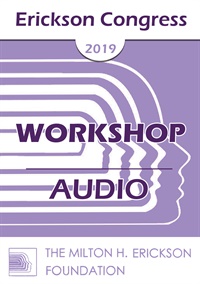
- Average Rating:
- Not yet rated
- Topic Areas:
- Workshops | Anxiety | Cognitive Behavior Therapy (CBT) | Hypnosis | Mindfulness | Worry
- Categories:
- Erickson Congress | Erickson Congress 2019
- Faculty:
- Carolyn Daitch, PhD
- Duration:
- 2 Hours 2 Minutes
- Format:
- Audio Only
- Original Program Date:
- Dec 15, 2019
- Short Description:
- Anxiety destroys the normal enjoyment of life through the fear, worry, obsessive thinking and avoidant behavior that anxious people experience. Simple activities like going to the grocery store, taking a child to her first day of school, or meeting a friend for lunch trigger a barrage of frantic “what ifs.” This demonstration will explore the subtleties of working with this pervasive category of disorders, and will introduce a powerful, integrative therapy model.
- Price:
- $15.00 - Base Price
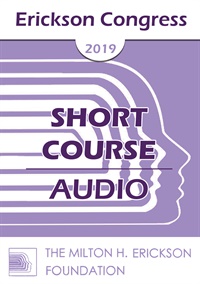
- Average Rating:
- Not yet rated
- Topic Areas:
- Short Courses | Anxiety | Depression | Ericksonian Hypnosis and Therapy Techniques | Children and Adolescent Therapy | Eye Movement Desensitization and Reprocessing (EMDR) | Hypnosis | Cognitive Behavior Therapy (CBT)
- Categories:
- Erickson Congress | Erickson Congress 2019
- Faculty:
- Joseph Sestito, MSSA, LISW-S
- Duration:
- 1 Hour 33 Minutes
- Format:
- Audio Only
- Original Program Date:
- Dec 12, 2019
- Short Description:
- The first factor that is of central importance is developing a strong therapeutic alliance with the client, mainly through empathically relating to him/her. Second, it will be shown how to guide adolescents and younger children to identify the specific Activating Event (AE) that is bringing about their unhealthy negative emotions through triggering self-defeating cognition(s).
- Price:
- $15.00 - Base Price
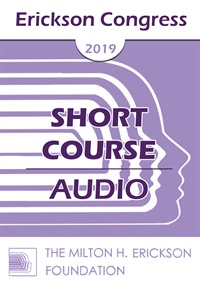
- Average Rating:
- Not yet rated
- Topic Areas:
- Short Courses | Insomnia | Cognitive Behavior Therapy (CBT) | Hypnosis
- Categories:
- Erickson Congress | Erickson Congress 2019
- Faculty:
- Chenggang Jiang, PhD
- Duration:
- 1 Hour 7 Minutes
- Format:
- Audio Only
- Original Program Date:
- Dec 12, 2019
- Short Description:
- In our previous research we found that CBT-I (Cognitive-Behavior Therapy for insomnia) cannot effectively improve sleep in patients with anxiety or depression. Actually, most of insomnia patients are co-morbid with anxiety and depression. So we find a new way to add some hypnotic elements in CBT-I to supplement the limitation of CBT-I. We collects some data, the analytic conclusion showed that hypnosis combined with CBT-I can effectively improve sleep quality and anxiety in insomnia patients. So, this presentation will show what is the specific procedure and clinical practice of this treatment model.
- Price:
- $15.00 - Base Price
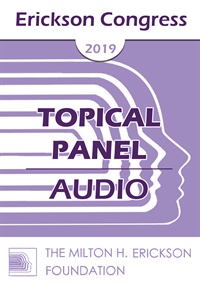
- Average Rating:
- Not yet rated
- Topic Areas:
- Workshops | Obsessive Compulsive Disorder (OCD) | Cognitive Behavior Therapy (CBT) | Brief Therapy
- Categories:
- Erickson Congress | Erickson Congress 2019
- Faculty:
- Reid Wilson, PhD
- Duration:
- 1 Hour 58 Minutes
- Format:
- Audio Only
- Original Program Date:
- Dec 12, 2019
- Short Description:
- You will learn the core strategies of a cognitive therapy intervention that radically and swiftly shifts the client’s point of view regarding both their relationship with OCD and the tactics of change. The principles will be illustrated by brief video clips of a 45-minute initial treatment session from the author's live demonstration at the 2018 Brief Therapy Conference. These will include establishing rapport, developing placebo, generating an outcome picture, dismantling their dysfunctional logical system, and persuading them to adopt the paradoxical frame of reference.
- Price:
- $15.00 - Base Price
Credit available - Click Here for more information
- Average Rating:
- Not yet rated
- Topic Areas:
- Keynotes | Anxiety | Brief Therapy | Cognitive Behavior Therapy (CBT) | Depression
- Categories:
- Brief Therapy Conference | Brief Therapy Conference 2018 | Online Continuing Education
- Faculty:
- David Burns, MD
- Course Levels:
- Master Degree or Higher in Health-Related Field
- Duration:
- 1:00:36
- Format:
- Audio and Video
- Original Program Date:
- Dec 09, 2018
- Short Description:
- Dr. Burns will describe powerful new TEAM-CBT techniques that can greatly accelerate recovery from depression and anxiety disorders. He will bring these tools with life with dramatic video excerpts from a therapy session with a mental health professional who had been struggling with years of intense anxiety, depression, and guilt.
- Price:
-
Sale is $29.00
price reduced from Base Price - $59.00
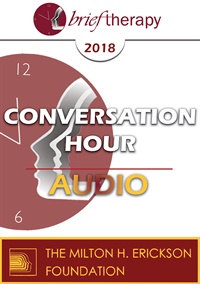
- Average Rating:
- Not yet rated
- Topic Areas:
- Great Conversations | Depression | Brief Therapy | Cognitive Behavior Therapy (CBT) | Couples Therapy | Resilience | Strategic Therapy | Therapist Development | Therapy Practice
- Categories:
- Brief Therapy Conference | Brief Therapy Conference 2018 | Pioneers in Couples and Family Therapy
- Faculty:
- Judith Beck, PhD | Michele Weiner-Davis, LCSW
- Duration:
- 59:10
- Format:
- Audio Only
- Original Program Date:
- Dec 08, 2018
- Short Description:
- This conversation explores CBT-informed approaches to depression, emphasizing behavioral activation, therapeutic alliance, and clinical flexibility. Beck and Weiner-Davis discuss how hope, core beliefs, and relational support shape recovery, while also addressing medication, family inclusion, and the value of comprehensive evaluation.
- Price:
- $15.00 - Base Price
Credit available - Click Here for more information
- Average Rating:
- Not yet rated
- Topic Areas:
- Workshops | Brief Therapy | Cognitive Behavior Therapy (CBT) | Therapist Development | Anxiety | Depression | Resistance
- Categories:
- Brief Therapy Conference | Brief Therapy Conference 2018 | Online Continuing Education
- Faculty:
- David Burns, MD | Jill Levitt, PhD
- Course Levels:
- Master Degree or Higher in Health-Related Field
- Duration:
- 2:00:37
- Format:
- Audio and Video
- Original Program Date:
- Dec 07, 2018
- Short Description:
- Dr. David Burns and his colleague, Dr. Jill Levitt, will do live therapy with an audience volunteer who’s been struggling with depression and anxiety. They will give you the unique opportunity to go behind closed doors to see how TEAM-CBT actually works in real time. When you witness the rapid transformation of intense self -doubt into joy, relief, and enlightenment, you will feel much better about yourself, while at the same time learning some awesome new tools that you can use right away to improve your clinical outcomes. This promises to be an exciting, educational and inspirational experience!
- Price:
-
Sale is $29.00
price reduced from Base Price - $59.00
Credit available - Click Here for more information
- Average Rating:
- Not yet rated
- Topic Areas:
- Short Courses | Children and Adolescent Therapy | Cognitive Behavior Therapy (CBT) | Hypnosis
- Categories:
- Brief Therapy Conference | Brief Therapy Conference 2018 | Online Continuing Education
- Faculty:
- Jeffrey Lazarus, MD, FAAP
- Course Levels:
- Master Degree or Higher in Health-Related Field
- Duration:
- 1:09:51
- Format:
- Audio and Video
- Original Program Date:
- Dec 06, 2018
- Short Description:
- David Burns, MD, has developed TEAM therapy (Testing, Empathy, Agenda Setting, and Methods), using new tools, including new forms of communication skills that can be applied to any type of therapy (CBT, psychodynamic, hypnosis, etc.), enhancing results and speeding up the process. This is the first time the same model that Dr. Burns has been using and teaching for adults will be shown in working with children and adolescents.
- Price:
-
Sale is $29.00
price reduced from Base Price - $59.00
- Average Rating:
- Not yet rated
- Topic Areas:
- Speeches with Discussants | Cognitive Behavior Therapy (CBT) | Anxiety | Depression | Psychotherapy | Therapist Development
- Categories:
- Evolution of Psychotherapy | Evolution of Psychotherapy 2017 | Evolution of Psychotherapy CBT Learning Track
- Faculty:
- David Burns, MD | Jeffrey Zeig, PhD
- Course Levels:
- Master Degree or Higher in Health-Related Field
- Duration:
- 1:19:51
- Format:
- Audio and Video
- Original Program Date:
- Dec 16, 2017
- Short Description:
- Although there's been an overwhelming proliferation of new therapies for depression and anxiety, the controlled outcome studies have yielded disappointing results. Dr. Burns argues that this is because resistance has not been addressed, and describes a new approach called TEAM-CBT that solves this problem and promises superior outcomes.
- Price:
-
Sale is $29.00
price reduced from Base Price - $59.00
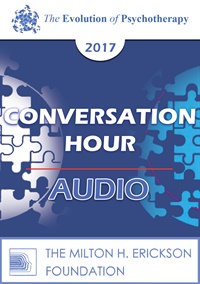
- Average Rating:
- Not yet rated
- Topic Areas:
- Conversation Hours | Cognitive Behavior Therapy (CBT) | Psychotherapy
- Bundle(s):
- Learning Track - EP17 CBT Download
- Categories:
- Evolution of Psychotherapy | Evolution of Psychotherapy 2017 | Evolution of Psychotherapy CBT Learning Track
- Faculty:
- David Burns, MD
- Duration:
- 1:03:48
- Format:
- Audio Only
- Original Program Date:
- Dec 16, 2017
- Short Description:
- Dr. Burns will describe his personal evolution from biological psychiatry during his psychiatric residency to cognitive behavior therapy, and then to the new TEAM-CBT, which he has recently developed. TEAM-CBT aims for extremely high-speed treatment using innovative cognitive and motivational (resistance-busting) techniques. He will invite questions from audience participants.
- Price:
- $15.00 - Base Price
Credit available - Click Here for more information
- Average Rating:
- Not yet rated
- Topic Areas:
- Keynotes | Cognitive Behavior Therapy (CBT) | Psychotherapy
- Bundle(s):
- Learning Track - EP17 CBT Stream
- Categories:
- Evolution of Psychotherapy | Evolution of Psychotherapy 2017 | Evolution of Psychotherapy CBT Learning Track | Online Continuing Education
- Faculty:
- Aaron Beck, MD | Judith Beck, PhD
- Course Levels:
- Master Degree or Higher in Health-Related Field
- Duration:
- 56:33
- Format:
- Audio and Video
- Original Program Date:
- Dec 16, 2017
- Short Description:
- According to a recent survey, Cognitive Therapy is now the leading form of psychotherapy throughout the world. Its application to the numerous psychological disorders, as well as medical problems, has been well documented. In recent years, Cognitive Therapy has been successfully applied to the most intractable and chronic disorders, such as severe mental illness. Strategies and techniques in treating schizophrenia will be described.
- Price:
-
Sale is $29.00
price reduced from Base Price - $59.00
Credit available - Click Here for more information
- Average Rating:
- Not yet rated
- Topic Areas:
- Speeches | Cognitive Behavior Therapy (CBT) | History of Psychotherapy | Psychotherapy
- Bundle(s):
- Learning Track - EP17 CBT Stream
- Categories:
- Evolution of Psychotherapy | Evolution of Psychotherapy 2017 | Evolution of Psychotherapy CBT Learning Track | Online Continuing Education
- Faculty:
- Donald Meichenbaum, PhD
- Course Levels:
- Master Degree or Higher in Health-Related Field
- Duration:
- 1:02:36
- Format:
- Audio and Video
- Original Program Date:
- Dec 15, 2017
- Short Description:
- The presentation will trace the evolution of cognitive behavior therapy, showing the “untold story” and critically evaluate its present status. It will also consider the future intervention of computer technology.
- Price:
-
Sale is $29.00
price reduced from Base Price - $59.00
Credit available - Click Here for more information
- Average Rating:
- Not yet rated
- Topic Areas:
- Great Debates | Cognitive Behavior Therapy (CBT) | Experiential Therapy | Psychotherapy
- Bundle(s):
- Learning Track - EP17 CBT Stream | Learning Track - EP17 Erickson Stream
- Categories:
- Evolution of Psychotherapy | Evolution of Psychotherapy 2017 | Evolution of Psychotherapy CBT Learning Track | Evolution of Psychotherapy Erickson Learning Track | Online Continuing Education
- Faculty:
- Stephen Gilligan, PhD | Donald Meichenbaum, PhD
- Course Levels:
- Master Degree or Higher in Health-Related Field
- Duration:
- 1:19:30
- Format:
- Audio and Video
- Original Program Date:
- Dec 14, 2017
- Short Description:
- This exchange will focus on the classic question of whether good therapy should focus more on cognitive or experiential changes. The merits of each, and the possibility of a “both/and” partnership, are considered.
- Price:
-
Sale is $29.00
price reduced from Base Price - $59.00
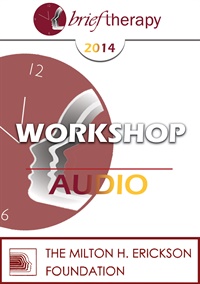
- Average Rating:
- Not yet rated
- Topic Areas:
- Anxiety | Depression | Trauma | Cognitive Behavior Therapy (CBT) | Hypnosis | Workshops | Ericksonian Hypnosis and Therapy Techniques | Milton Erickson | Brief Therapy | Naturalistic
- Categories:
- Brief Therapy Conference | Brief Therapy Conference 2014
- Faculty:
- Ernest Rossi, PhD | Kathryn Rossi, PhD | Roxanna Erickson Klein, RN, PhD, LPC, LCDC
- Duration:
- 1:59:16
- Format:
- Audio Only
- Original Program Date:
- Dec 12, 2014
- Short Description:
- Ernest Rossi, PhD, Roxanna Erickson-Klein and Kathryn Rossi review the case work of Milton H. Erickson, MD in counseling, psychotherapy, therapeutic hypnosis and rehabilitation as evidence-based cognitive behavior therapy to treat anxiety, depression and trauma. This experiential workshop explores the timeless nature of the work of Milton H. Erickson, who substantially influenced the manner that psychotherapy is practiced in the 21 century.
- Price:
- $15.00 - Base Price
- Average Rating:
- Not yet rated
- Topic Areas:
- Keynotes | Psychotherapy | Cognitive Behavior Therapy (CBT) | History of Psychotherapy
- Categories:
- Evolution of Psychotherapy | Evolution of Psychotherapy 2013
- Faculty:
- Aaron Beck, MD
- Course Levels:
- Master Degree or Higher in Health-Related Field
- Duration:
- 1:02:55
- Format:
- Audio and Video
- Original Program Date:
- Dec 15, 2013
- Short Description:
- The discussion will center on the evolution of the cognitive model of psychopathology and psychotherapy since its earlier stage. The expansion of therapy has included all of the common disorders and many of the medically related disorders will be explored. Finally, we will focus on the future of cognitive therapy and psychotherapy in general. Special attention will be paid to the relationship of other psychotherapies.
- Price:
-
Sale is $29.00
price reduced from Base Price - $59.00
- Average Rating:
- Not yet rated
- Topic Areas:
- Clinical Demonstrations | Cognitive Behavior Therapy (CBT) | Eating Disorders | Psychotherapy
- Categories:
- Evolution of Psychotherapy | Evolution of Psychotherapy 2013
- Faculty:
- Judith Beck, PhD
- Course Levels:
- Master Degree or Higher in Health-Related Field
- Duration:
- 57:13
- Format:
- Audio and Video
- Original Program Date:
- Dec 13, 2013
- Short Description:
- The presenters will conduct a live interview with a participant who has struggled to lose weight or maintain a weight loss. They will demonstrate specific techniques to motivate the dieter and help him/her consistently use good eating habits, and solve dieting dilemmas.
- Price:
-
Sale is $29.00
price reduced from Base Price - $59.00
- Average Rating:
- Not yet rated
- Topic Areas:
- Workshops | Motivation | Psychotherapy | Resistance | Therapeutic Relationship | Therapist Development | Cognitive Behavior Therapy (CBT)
- Categories:
- Evolution of Psychotherapy | Evolution of Psychotherapy 2013
- Faculty:
- Judith Beck, PhD
- Course Levels:
- Master Degree or Higher in Health-Related Field
- Duration:
- 3:04:03
- Format:
- Audio and Video
- Original Program Date:
- Dec 12, 2013
- Short Description:
- This interactive workshop presents a method for identifying, conceptualizing, and solving common problems in treatment. What do you do when patients present difficulties—for example, when they don’t do homework, get angry at the therapist, are afraid to reveal, go off on tangents, arrive late to session, demand special entitlements, engage in self-harm behaviors between sessions, jump from one crisis to another? Specialized techniques, adapted from psychodynamic, supportive, Gestalt, interpersonal, and other psychotherapeutic modalities, are often needed.
- Price:
-
Sale is $29.00
price reduced from Base Price - $59.00
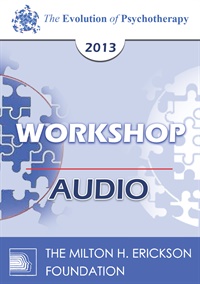
- Average Rating:
- Not yet rated
- Topic Areas:
- Workshops | Psychotherapy | Cognitive Behavior Therapy (CBT) | Emotionally Focused Therapy (EFT) | Therapist Development
- Categories:
- Evolution of Psychotherapy | Evolution of Psychotherapy 2013
- Faculty:
- David Barlow, PhD
- Duration:
- 2 Hours 54 Minutes
- Format:
- Audio Only
- Original Program Date:
- Dec 11, 2013
- Short Description:
- This workshop will present recent developments in the application of a transdiagnostic unified, cognitive behavioral and emotion-focused approach to treating emotional disorders. Workshop participants will learn how to apply treatment components to a wide range of emotional disorders . Workshop participants will learn how to apply treatment components to a wide range of emotional disorders in adults through instruction, case examples, and video clinical vignettes.
- Price:
- $15.00 - Base Price
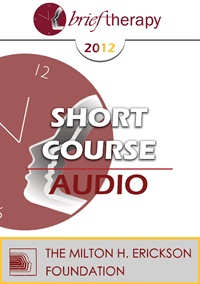
- Average Rating:
- Not yet rated
- Topic Areas:
- Couples Therapy | Short Courses
- Categories:
- Brief Therapy Conference | Brief Therapy Conference 2012
- Faculty:
- Birgitta Gregory, PhD | Bruce Gregory, PhD
- Duration:
- 1:28:56
- Format:
- Audio Only
- Original Program Date:
- Dec 09, 2012
- Short Description:
- BT12 Short Course 35 – An Integrative and Creative Approach Working with Couples Achieving Lasting Solutions – Bruce Gregory, PhD and Birgitta Gregory, PhD This short course will focus on the treatment of couples from the perspectives of symptoms, rigid, dysfunctional behavior patterns, and narcissistic defenses. An integrative approach utilizing creativity and humor will be presented, incorporating CBT, psychodynamic, Ericksonian, Jungian and existential perspectives. Validation, sequencing, containment and questions that facilitate accountability will be highlighted in the context of empowering clients on a variety of levels.
- Price:
- $15.00 - Base Price
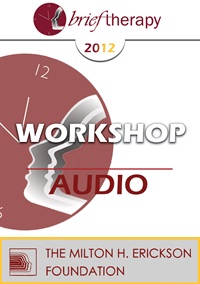
- Average Rating:
- Not yet rated
- Topic Areas:
- Anxiety | Cognitive Behavior Therapy (CBT) | Workshops
- Categories:
- Brief Therapy Conference | Brief Therapy Conference 2012
- Faculty:
- Frank Dattilio, PhD, ABPP
- Duration:
- 2:31:56
- Format:
- Audio Only
- Original Program Date:
- Dec 08, 2012
- Short Description:
- BT12 Workshop 29 – Short-Term Treatment of Anxiety and Medical Illness – Frank Dattilio, PhD, ABPP Clinicians are very likely to encounter patients in their clinical practice that experience both anxiety and medical illness. Sometimes differentiating the symptoms of each can become extremely difficult and can serve to exacerbate either condition. This workshop will introduce some of the cognitive-behavioral techniques that are used in helping clinicians differentiate symptoms and also intervene, providing patients with skills for managing their anxiety, as well as their medical illness.
- Price:
- $15.00 - Base Price
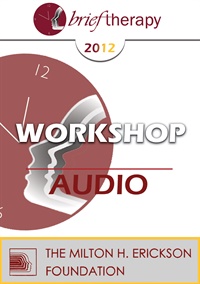
- Average Rating:
- Not yet rated
- Topic Areas:
- Cognitive Behavior Therapy (CBT) | Couples Therapy | Workshops
- Categories:
- Brief Therapy Conference | Brief Therapy Conference 2012
- Faculty:
- Frank Dattilio, PhD, ABPP
- Duration:
- 2:48:16
- Format:
- Audio Only
- Original Program Date:
- Dec 08, 2012
- Short Description:
- BT12 Workshop 34 – Cognitive-Behavioral Techniques with Couples – Frank Dattilio, PhD, ABPP This workshop focuses on the specific use of cognitive-behavioral strategies as an adjunct to the many treatment modalities of couples’ therapy. It offers a basic overview of the theories of cognitive-behavioral therapy, particularly as it applies to couples. Participants will learn firsthand techniques and strategies for working with difficult couples and how to integrate these strategies with their respective modes of treatment. The presentation is followed by a videotape that demonstrates the implementation of techniques and interventions.
- Price:
- $15.00 - Base Price
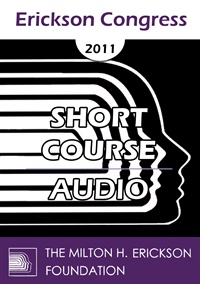
- Average Rating:
- Not yet rated
- Topic Areas:
- Short Courses | Hypnosis | Brief Therapy | Hypnotherapy | Anxiety | Cognitive Behavior Therapy (CBT) | Depression
- Categories:
- Erickson Congress | Erickson Congress 2011
- Faculty:
- Assen Alladin, PhD
- Duration:
- 1:32:25
- Format:
- Audio Only
- Original Program Date:
- Dec 09, 2011
- Short Description:
- There is growing evidence for an additive effect when hypnosis is combined with brief therapies in the management of various emotional disorders. This workshop will describe Cognitive Hypnotherapy, an innovative integrated approach to brief psychotherapy that systematically combines hypnotic techniques with CBT in the management of various emotional disorders to enhance treatment outcome and prevent relapse. This course will be invaluable to therapists who wish to broaden their skills in the management of emotional disorders.
- Price:
- $15.00 - Base Price
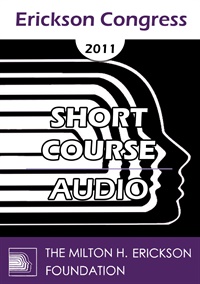
- Average Rating:
- Not yet rated
- Topic Areas:
- Cognitive Behavior Therapy (CBT) | Depression | Short Courses | Mindfulness | Attention Deficit Disorder (ADD)
- Categories:
- Erickson Congress | Erickson Congress 2011
- Faculty:
- Joseph Sestito, MSSA, LISW-S
- Duration:
- 1:34:42
- Format:
- Audio Only
- Original Program Date:
- Dec 09, 2011
- Short Description:
- The basics about mindfulness and cognitive-behavioral therapy will be explained, along with the re-search findings which show that aerobic exercise helps both ADD and depression through improving brain functioning. Participants will become acquainted with ten mindfulness skills, four CBT methods and five types of aerobic exercise which can help their clients. Participants will see how they can be the instruments who help their clients deliver themselves from distraction to distinction.
- Price:
- $15.00 - Base Price
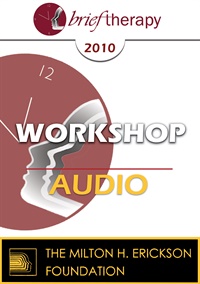
- Average Rating:
- Not yet rated
- Topic Areas:
- Cognitive Behavior Therapy (CBT) | Couples Therapy | Workshops
- Categories:
- Brief Therapy Conference | Brief Therapy Conference 2010
- Faculty:
- Frank Dattilio, PhD, ABPP
- Duration:
- 2:02:42
- Format:
- Audio Only
- Original Program Date:
- Dec 12, 2010
- Short Description:
- BT10 Workshop 40 - Cognitive-Behavioral Techniques with Couples - Frank M. Dattilio, PhD, ABPP This workshop focuses on the specific use of cognitive-behavioral strategies as an adjunct to the many treatment modalities of couples therapy. It offers a basic overview of the theories of cognitive-behavioral therapy, particularly as it applies to couples. Participants will learn first-hand techniques and strategies for working with difficult couples and how to integrate these strategies with their respective modes of treatment. The presentation is followed by a videotape that demonstrates the implementation of techniques and interventions.
- Price:
- $15.00 - Base Price


